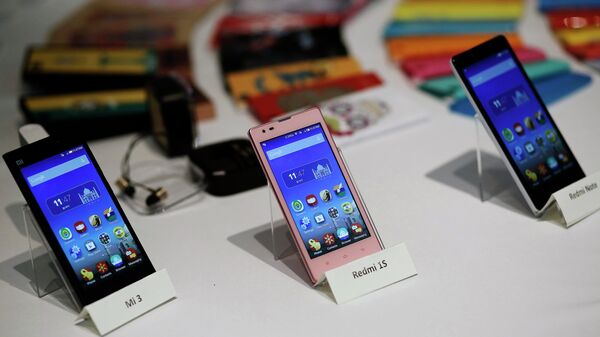MOSCOW, December 30 (Sputnik) — Xiaomi, a breakthrough Chinese smartphone manufacturer, has been valued at $45 billion US after its fifth round of fundraising, which raised $1.1 billion from eager investors. Russian billionaire venture capitalist Yuri Milner has said that the valuation may eventually rise to up to $100 billion, Bloomberg reported.
"In every conceivable benchmark, [Xiaomi is] almost unprecedented in terms of its speed of growth," Milner told Bloomberg. He noted that the company "has significant potential to become China's first global consumer brand," with strong potential not just for the smartphone market, but for other consumer electronics as well.
With its global smartphone market share now standing at 5.3 percent, the company is now neck and neck for third place with fellow Chinese company Huawei, behind Samsung (23.8 percent) and Apple (12 percent).
Monday's appraisal more than quadrupled a summer 2013 valuation of $10 billion of the four-year-old company, and brought about investor expectations of the announcement of an IPO, which Xiaomi insiders say is still years away, the New York Times explained.
The ambitious company has sold a total of 44 million smartphones in the first nine months of this year, 18 million in the third quarter alone, Xinhua has explained. The company's revenues for 2014 are set to exceed $12 billion, Bloomberg has noted, and the company has plans to sell 100 million phones next year.
Minimalist design, suave internet and social-media-based marketing, and the tactic of using artificial scarcity during product launches have brought observers to make comparisons between Xiaomi and Apple. Lei's tendency to wear the informal attire of a t-shirt, jeans and sneakers to company presentations haven't helped, with the Lei being dubbed "the Steve Jobs of China", and his company "the Apple of China", Business Insider explained. However, the newspaper noted that unlike Apple, Xiaomi is not immodest, and relies heavily on user input into the design of its products. Moreover, despite waging aggressive lawsuits against Motorola, HTC and Samsung in the past over perceived copyright violations, Apple has yet to do so against the Zhongguancun, Beijing-based company.
Experts have noted that in the coming years, the company will be focusing on making inroads into developing markets in Asia, and in the BRICS countries. Forbes contributor Ewan Spence noted that the company will not be focusing on what are considered the saturated and contract-burdened markets of the US and Europe. The company hit a snag in India earlier this month, when a Delhi High Court decided to temporarily ban the sale of its products over a patent-related complaint filed by Ericsson. The ban has been temporarily lifted until early next month, when the Court will conduct a formal hearing with representatives from both companies.



